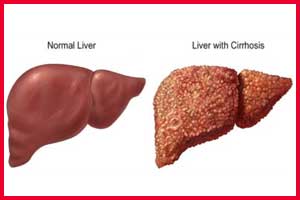- Home
- Editorial
- News
- Practice Guidelines
- Anesthesiology Guidelines
- Cancer Guidelines
- Cardiac Sciences Guidelines
- Critical Care Guidelines
- Dentistry Guidelines
- Dermatology Guidelines
- Diabetes and Endo Guidelines
- Diagnostics Guidelines
- ENT Guidelines
- Featured Practice Guidelines
- Gastroenterology Guidelines
- Geriatrics Guidelines
- Medicine Guidelines
- Nephrology Guidelines
- Neurosciences Guidelines
- Obs and Gynae Guidelines
- Ophthalmology Guidelines
- Orthopaedics Guidelines
- Paediatrics Guidelines
- Psychiatry Guidelines
- Pulmonology Guidelines
- Radiology Guidelines
- Surgery Guidelines
- Urology Guidelines
Diabetes patients at higher risk of liver cirrhosis and liver cancer

According to a study led by Queen Mary University of London and the University of Glasgow,many patients with potentially deadly liver cirrhosis and liver cancer are being diagnosed at late advanced stages of Diabetes.
The study of 18 million people across Europe also suggests the people living with type 2 diabetes are at particular risk of this 'silent disease' and should be monitored closely to prevent life-threatening disease progression.
Non-alcoholic fatty liver disease (NAFLD) affects up to a quarter of people in the West and is the most common cause of liver disease around the world. It is closely associated with obesity and type 2 diabetes and its rise mirrors the social problems of poor diets and sedentary lifestyles. GPs are often unaware of the condition and patients often go undiagnosed.
For the majority, NAFLD is a benign condition, but one in six people will go on to develop the aggressive form of disease, called non-alcoholic steatohepatitis (NASH), leading to liver injury, scarring and eventually in some to cirrhosis, liver failure and even liver cancer. By identifying which patients might go on to develop the more aggressive disease, interventions and treatments could be targeted to those at greatest need.
In the largest study of its kind, published in the journal BMC Medicine, the team combined the healthcare records of 18 million European adults from the UK, Netherlands, Italy and Spain. They matched each NAFLD patient to 100 patients who did not have a recorded diagnosis, and looked to see who developed liver cirrhosis and liver cancer over time.
Lead researcher Dr William Alazawi from Queen Mary University of London said: "We were surprised that the number of patients with recorded diagnoses of non-alcoholic fatty liver was much less than expected, meaning that many patients are actually undiagnosed in primary care. Even over the short time frame of the study, some patients progressed to more advanced, life threatening stages of disease, suggesting that they are being diagnosed very late.
"The public, doctors and policy makers need to be aware of this silent disease and strategies need to be put in place to tackle the root causes and avoid progression to life-threatening stages.
"People living with diabetes are at increased risk of more advanced, life-threatening stages of disease, suggesting that we should be focusing our efforts in educating and preventing liver disease in diabetes patients."
Naveed Sattar from the University of Glasgow added: "Doctors treating patients with diabetes already have a lot to check on - eyes, kidneys, heart risks - but these results remind us that we should not neglect the liver, nor forget to consider the possibility of NASH. They also remind us that perhaps more efforts are needed to help our patients with diabetes lose weight and cut alcohol."
More than 136,000 patients were identified with NAFLD/NASH and were more likely to have type 2 diabetes, hypertension and obesity than matched controls.
The strongest association was observed in NAFLD/NASH patients who had a diagnosis of type 2 diabetes - they were more than twice as likely to develop aggressive liver disease. This suggests that diabetes could be a good predictor of liver disease progression.
Looking at particular types of advanced liver disease, NAFLD/NASH patients were almost five times more likely to be diagnosed with cirrhosis and more than three and a half times more likely to be diagnosed with liver cancer.
The study also found that NAFLD/NASH patients acquired diagnoses of life-threatening liver disease within a relatively short time (around 3.3 years). The researchers say that it is not feasible that this reflects true rates of disease progression. The acquisition of a new diagnosis in the healthcare record does not necessarily mean that disease progression has occurred at that time, nor that the advanced disease did not exist at the time of the initial diagnosis. This suggests that patients in Europe are being diagnosed at the later stages of disease, which are associated with greater risk of liver-related mortality.
The results also suggests that primary care records under-estimate disease severity and that some patients with NAFLD diagnoses actually have advanced cirrhosis already.
The research was funded by the European Union's Innovative Medicines Initiative and Dr William Alazawi was funded by the Medical Research Council.
For more details click on the link: http://dx.

Disclaimer: This site is primarily intended for healthcare professionals. Any content/information on this website does not replace the advice of medical and/or health professionals and should not be construed as medical/diagnostic advice/endorsement or prescription. Use of this site is subject to our terms of use, privacy policy, advertisement policy. © 2020 Minerva Medical Treatment Pvt Ltd